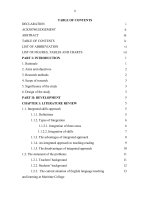English language teaching methods, tools techniques
Bạn đang xem bản rút gọn của tài liệu. Xem và tải ngay bản đầy đủ của tài liệu tại đây (6.66 MB, 201 trang )
ENGLISH LANGUAGE
TEACHING
(METHODS, TOOLS
& TECHNIQUES)
Dr. M.F. Patel
Praveen M. Jain
PUBUSHERS & DISTRIBUTORS
E·566, Valshali Nagar, Near Akashwani Colony, Jalpur • 302021(Raj.)
Published by :
SUNRISE PUBLISHERS & DISTRIBUTORS
E-566, Vaishali Nagar,
Jaipur- 302021 (Raj.)
Ph.:9413156675,9772299149(M)
First Published - 2008
©Reserved
ISBN: 978-81-906067-4-5
Printed at : Jaipur
All rights reserved. No pa.i of this book may be reproduced in any form or
by any mean without permission in writing from the publisher.
Dedicated to
Shrj M.N. Patel
Honourable President, Rajpur
Kelvani MandaI, Rajpur,
Vijayanagar, Gujrat
"This page is Intentionally Left Blank"
•••••
PREFACE
---------------------Teaching of English as a second language in India
has assured an important place. Now, English is one of the
most widely used International language. The book
introduces some of the main areas that students and
teachers of English in India understand in order to follow
a scientific approach. The book covers many topics that
find place in the syllabi of universities of India. There is no
doubt that' this book will prove useful to students, teachers
and scholar in Indian Universities.
We express our sense of gratitude to Dr. V.S. Patel,
Principal, Sflri oc 3mt. P.K. Kotawala Arts College, Patan;
Dr. J.H. Pancholi, Principal, B.Ed. College, 'Patan; Dr. B.S.
Patel, Principal, B.Ed. College, Daramali and Dr. S.S. Jain,
Principal, B.Ed. College, Vijaynagar for their constant
encouragement to complete our work.
We are thankful to the Trustee Shri M.N. Patel and
Honourable Secretary, Shri H.M. Patel of Rajpur Kelavani
MandaI, Rajpur for their positive attitude and conducive
atmosphere for our work.
We are thankful to our colleagues Shri J.M. Purohit,
Department of English; Shri B.N. Patel, Department of
Physical Education, Art College, Vijaynagar and Shri
JitendrakumaT J. Patel, Shri Deepak Pandya, Shri Akhilesh
JO,shi, Department of Education, REd. College, Vijaynagar
for their inspiration and encouragement to produce a book
of such a literary calibre.
We are thankful to the librarian, Shri A.P. Palat,
Vijaynagar Arts College for helping us in providing the
books that we needed for our work.
We also take this opportunity to express our thanks
to Shri Jitendra Gupta, Sunrise Publishers and Distributors,
Jaipur, India for his promptness in bringing out this book
in a very short time.
Authors
•••••
CONTENTS
---------------------•
Preface
v
1.
The Place of English In Indian Education
1
2.
Foreign Language Learning
25
3.
Instructional Material and Text Book
57
4.
Methods
71
5.
Approaches
89
6.
Oral Work
102
7.
Reading
113
8.
Writing and Composition
125
9.
Teaching of Prose, Poetry and Grammar
133
10. Skills and Competencies of English Teacher
145
"This page is Intentionally Left Blank"
.....
1
THE PLACE OF ENGLISH IN INDIAN
EDUCATION
---------------------PIIIIElI... ,.. . . . . . .
I
1
It is not taught as
compulsory subject
It is taught o n : ]
It is not compul~ory atl-Examination
It is taught at upper
English Level
It is not compulsory
for Eng lis h
English
I
I
It is taught as
Second Language
2
The Place of English in Indian Education
Introduction:
English plays a key role in our educational system
and national life. The British introduced English in our
educational system in order to produce cheap clerks for
their colonial administration and to produce, what Lord
Macaulay called: a class of people, Indian in blood and
colour, but English in taste~ in opinions, in morals and in
intellect." So long as the British ruled over India, English
could not be displaced from the position of predominance
given it by Lord Macaulay. British came here as traders
and their first,attention was on trade. At first they did not
concentrate their attention on teaching of English. English
helped the growth of nationalism which ultimately freed
India from foreign fetters.
U
English is rich in literature and culture. English served
as a great unifying force in India's freedom struggle. English
is a link language. It has greatly contributed to the
advancement of learning. It reflects in our ways and views.
After independence, the English spread like water in India
and it became very essential for India to have a national
language. The teaching of English should be made more
practical and language-oriented. English is to be taught as
language of comprehension rather than as literary
language. The role of English within a nation's daily life is
influenced by geographical, cultural and political factors.
The role of English at a given point in time must affect
both the way it is taught and the resultant impact on the
daily life and growth of the individual.
Position of English:
English is the language that is found in all comers of
India. English is the language of the global village. It is a
language of trade and industry. English is full of knowledge
and information. English is the language that is used for
The Place of English in Indian Education
3
IMPORTANCE OF SECOND AND
FOREIGN LANGUAGE
~
1
"'
INTERNATIONAL LANGUGE
.,J
LmERARY IMPORTANCE
.1
NATIONAL IMPORTANCE
l
.1
RECREATIONAL IMPORT ANCI!:
"'
I
I
I
I
.I
EDUCATIONAL IMPORTANCE
I
J
CULTURAL IMPORTANCE
,
I
VOCATIONAL IMPORTANCE
I
I
1
4
The Place of English in Indian Education
connecting peoples having different tongues. Champion
has said:
In considering the position of English
language in India, the outstanding
consideration in the English is the
language of the government public
administration, the legislature and
law courts. It is the language of
commerce and business. It is the
medium of communication between
two persons and between various
language areas.
When India became independent then a controversy
began about the place, importance and study of the English.
People like Rajgopal Chari favoured its importance and
place. But who were nationalist, they did not support the
view of Rajgopal Chari and said that British should leave
this place early with English. They declared that students
can express their ideas and thought in their mother tongue
language. Other causes responsible for revolt against
English were lack of use of English in every day life,
defective method of teaching of English and British policy
of preserve clerks.
But we can ignore that by learning and speaking for
the last 150 years, English has become the language of
Indians to a great extent. This language has taught them
to love freedom and democratic way of life. It has knit them
into one unit. It has made them capable to take an
advantage of western scientific researches and inventions.
We should give the Hindi place of national language. But
we should not forget that English is too important for us so
it should not be completely removed from the Indian
curriculum.
The Place of English in Indian Education
(1)
5
Place of English in Curriculum of State:
It is misfortune of Gujarat people that Gujarat
Government has not decided its language teaching policy
and in clear terms. It runs without visualizing the benefits
and advantage of English language from students' point
of view, from national point of view and the state
development point of view.
The place and position of English can be summarized
as under:
•
English is not being taught as a compulsory
subject at lower primary level. It is taught only
in some private school.
•
English is taught as a compulsory subject at
upper primary level in class V, VI and VII. But
there are no enough qualified teachers of
English.
•
It is being taught as a compulsory subject at
secondary level in class VIII, IX and X. It is not
compulsory at H.5.C. Examination.
•
In higher secondary level, it is being taught as
compulsory subject in class- XI.
•
It is also being taught as compulsory subject at
college level. Students passed H.S.C. Exam
without English are allowed offering English at
college level in some universities and they have
to study English compulsory.
Thus indefinite English language teaching policy of
Gujarat state has become the main reason for low education
standard and poor performance of Gujarati students at
national and international level.
6
The Place of English in Indian Education
(2) Importance of Second and Foreign Language
Teaching:
English is the language of the world and the
knowledge of the language makes a person, a citizen of
the world. Pandit Nehru has said "English is a big key on
the modern world." Its importance as international
language can be denied by none. For this ours reasons are
as follows:
1.
International Language :
English is the international language. International
English is the concept of the English language as a global
means of communication in numerous dialects, and also
the movement towards an international standard for the
language. It is spoken all over the world. This language is
mother tongue of nearly 320 million people and another
200 million people use it as second language. So it is vary
useful to establish international relation for communication
purpose and for the exchange of views with different
qmntries of the world. It is also referred to as Global English,
World English, Common English, or General English.
Sometimes these terms refer simply to the array of varieties
of English spoken throughout the world.
The English language evolved from a set of West
Germanic dialects spoken by the Angles, Saxons, and Jutes,
who arrived from the Continent in the 5th Century. Thus
English is more closely related to West Frisian than to any
other modern language, although less than a quarter of
the vocabulary of Modern English is shared with West
Frisian or other West Germanic languages because of
extensive borrowings from Norse, Norman French, Latin,
and other languages.
The establishment of the first permanent Englishspeaking colony in North America in 1607 was a major
The Place of English in Indian Education
7
step towards the globalization of the language. British
English was only partially standardized when the
American colonies were established. Isolated from each
other by the Atlantic Ocean, the dialects in England and
the colonies began evolving independently. In the 19th
century, the standardization of British English was more
settled than it had been in the previous century, and this
relatively well-established English was brought to Africa,
Asia and Oceania. It developed both as the language of
English-speaking settlers from Britain and Ireland, and as
the administrative language imposed on speakers of other
languages in the various parts of the British Empire. The
first form can be seen in New Zealand English, and the
latter in Indian English. In Europe English received a more
central role particularly since 1919, when the Treaty of
Versailles was composed not only in French, the common
language of diplomacy at the time, but also in English.
English as an additional language (EAL) usually is
based on the standards of either American English or
British English. English as an international language (ElL)
is EAL with emphasis on learning different major dialect
forms; in particular, it aims to equip students with the
linguistic tools to communicate internationally. Roger Nunn
considers different types of competence in relation to the
teaching of English as an International Language, arguing
that linguistic competence has yet to be adequately
addressed in recent considerations of ElL.
International English sometimes refers to English as
it is actually being used and developed in the world; as a
language owned not just by native speakers, but by all those
who come to use it.
It especially means English words and phrases
generally understood throughout the English-speaking
world as opposed to localisms. The importance of non-
8
The Place of English in Indian Education
native English language skills can be recognized behind
the long-standing joke that the international language of
science and technology is broken English. International
English reaches towards cultural neutrality. This has a
practical use:
What could be better than a type of
English that saves you from having
to re-edit publications for individual
regional markets! Teachers and
learners of English as a second
language also find. it an attractive
idea - both often concerned that
their English should be neutral,
without American or British or
Canadian or Australian coloring.
Any regional variety of English has
a set of political, social and cultural
connotations attached to it, even the
so-called 'standard' forms.- Peters
(2004, International English)
According to this viewpoint, International English is
a concept of English that minimizes the aspects defined by
either the colonial imperialism of Victorian Britain or the
so-called "cultural imperialism" of the 20th century United
States. While British colonialism laid the foundation for
English over much of the world, International English is a
product of an emerging world culture, very much
attributable to the influence of the United States as well,
but conceptually based on a far greater degree of crosstalk and linguistic transculturation, which tends to mitigate
both U.S. influence and British colonial influence.
The development of International English often
centers around academic and scientific communities, where
The Place of English in Indian Education
9
formal English usage is prevalent, and creative use of the
language is at a minimum. This formal International English
allows entry into Western culture as whole and Western
cultural values in general.
2.
Library Importance :
The Kothari Commission suggested that English be
studied as a library language with the aim of getting the
knowledge of science and technology, commerce and trade
by reading standard books in English. The Commission said
that no student be deemed qualified for a Master's Degree
unless he has acquired a reasonable proficiency in English
or in some other library language. In view of the fact that
the medium of instruction even at the Post Graduate stage
is the regional language in many Universities (only the
Professional courses are taught through English medium),
the Commission's recommendation would imply that
teachers at Post Graduate level should be essentially
bilingual, that is they should be able to teach in the regional
language as well as English.
English is a key to the store house of the knowledge.
The books on all branches of knowledge are written into
English language. The importance of English as a library
language nicely described by the Radha- Krishnan
commission in the following words:
English however must continue to be
studied. It is a language which is rich
in literature, humanistic, scientific
and technical. If under sentimental
we give up English, we could cut
ourselves from the living stream of
ever growing knowledge.
The use of English as a library language also implif's
that among the language skills of speaking, reading and
10
The Place of English in Indian Education
writing, the reading skill is the most important and it should
be developed in the students to a high degree so that they
will be able to read all reference material, general and
technical, which is in the English, make notes and use it
for their purposes. Students develop the ability to read fast
and with understanding. The skill of getting the summery
of books and periodicals in English quickly and properly is
the most useful in modern life. This is the essence of using
as a library language. Even with the growth of Indian
languages English continues to be the link language
between the States and the Centre and also between the
multilingual Indian communities, apart from its being a
valuable link with the world organizations and with the
growing knowledge in science and technology and trade.
English is a window on the world, opening up a vast vista
of knowledge and scholarship, literature and art.
3.
National Importance:
The English language is the window which opens up
the vast prospect of human achievement. The more effective
grasp of English in all its diversities of speech, vocabulary,
structure and meaning, the more will be benefit personally
and contribute to the growth of our country as a modern
nation of the 21 st century.
The chairman of the University Education
Commission Dr. Radhakrishnan's (1948) words on the
importance of English to India needs repetition:
It (English) is a language, which is
rich in literature - humanistic,
scientific and technical. If, under
sentimental urges we give up
English, we would cut ourselves off
from the living stream of ever
growing knowledge.
The Place of English in Indian Education
11
In India, English is the link language, serving to
connect people of various regions and diverse backgrounds.
English is the lingua franca of the people from the South,
North, East and West of India. English is the official
language, being the language used for communication
among the Central and State Governments.
English has also its national importance because it is
used as inter state communication language and in centre
also. In India it is used as link language so that people could
express their ideas easily. It is useful for both official and
private communication between many parts of the country
and thus it serves as a link language in the nation itself.
Pandit Nehru's words bear repetition about the invaluable
linking role of English in the country and across the world:
The language link is a greater link
between Us and the English speaking
people than any political link or
Commonwealth link or anything
else ... If you push out English, does
Hindi fully take its place? I hope it
will. I am sure it will. But I wish to
avoid the danger of one unifying
factor being pushed out without
another unifying factor fully taking
its place. In that event there will be a
gap, a hiatus. The creation of any
such hiatus or gap must be avoided
at all costs. It is very vital to do so in
the interest of the unity of the
country. It is this that leads me to the
conclusion that English is likely to
have an important place in the
foreseeable future.
12
The Place of English in Indian Education
IMPORTANCE OF MOTHER
TONGUE
IMPORTANCE OF MOTIVATION
I
LEARNING BY IMITATION
1
MAXIMUM OPPORTUNITIES
I
LEARNING BY SITUATION
I
The Place of English in Indian Education
13
Thus English helps us to keep pace with the explosion
of knowledge and scientific and technological
advancement. English has one of the richest literatures in
the world. India has gained immensely from its contact
with English linguistically, scientifically, politically,
administratively and in all spheres of modern activity.
English is the world's widely used language. It is useful to
distinguish three primary categories of use:
4.
1.
As a native language,
2.
As a second language and
3.
As a foreign language
Recreational Importance:-
English is one of the five languages of the United
States. It is the first language in UK, USA, Canada and
Australia. English is a source of recreation and useful
employment of leisure. Person who knows English can take
enjoy the best stories, dramas, novels etc. written in English
language. It is also the language of world sports, radio ard
television, telecommunication and internet, fashion and
glamour.
5.
Educational Importance :
Education systems around the world give special
attention to teaching of English. The main aims of teaching
English are language development and library
development. It enables students to understand spoken
English, speak English, read English and write perfect. The
English system of education was introduced in India in
1835 by the British. It was the language used by the British
administrators. The English was politically imposed on the
Indian education system. The University Education
Commission (1948) headed by Dr. Radhakrishnan
recommended:
14
The Place of English in Indian Education
English is studied in high schools and
universities in order that we may
keep in touch with the living stream
of ever growing knowledge. This
would prevent our isolation from the
world, and help us take advantage
of th~ wider reach of the English
langu~ge.
English is a direct medium of acquiring knowledge of
modem arts, science, technology and Humanities. It is also
important for politician, scientist, doctors, engineers,
educationists, businessmen and research workers. They
increase their knowledge and experience by reading books
available only in English language. Almost all our great
leaders, well-known scientists, renowned philosophers and
famous writers are the product of English education.
6.
Cultural Importance:
English widens one's cultural and intellectual horizon.
It develops commercial, scientific, technological relation
with other countries. English enriches knowledge of foreign
culture.
7. Vocational Importance :
English offers opportunities many and varied
vocational like diplomatic and foreign services, business,
commerce, medicine, teaching law etc. all over the world.
(3)
Importance of the Mother Tongue Language and
Habit:
According to Mahatma Gandhi: "The mother tongue
is as natural for the development of the man's mind as
mother's milk is for the development of the infant's body."
It helps child in all kinds thinking. As Ryburn remarks in
his book- The teaching of English:
The Place of English in Indian Education
15
Mother tongue is the basis of the all
works. Mother tongue learning
begins from infancy. Child learns
mother tongue naturally. When he
comes at the age of youth,
unconsciously he has learnt the
mother tongue and he can express
his ideas, feelings, and thoughts and
he can understands their. It is quite
right that mother tongue is not
taught but it is caught and foreign
language is first taught and after
caught.
The teaching of English through mother tongue is not
new. In earlier the third language Sanskrit was learnt
through mother tongue. English was also learnt with the
help of mother tongue language in the later half of the 19th
century. Justifying the use of mother tongue in the teaching
of English language, Ryburn remarked:
If sufficient attention of teaching of
mother tongue and if it is well taught,
habit may be formed in the class
room which will be of greatest value
in connection with the learning
English.
Importance of Mother Tongue in Teaching of English :
1.
Importance of Motivation :
Teacher should try always to motivate students to
learning the foreign language because motivation provides
the necessary encouragement for learning. In beginning
the child is motivated by his parents to use mother tongue
to express his thought, ideas and feelings and in same way
16
The Place of English in Indian Education
if a child is motivated by his teacher to learn English with
the help of mother tongue, he can easily learn English. A
students of correctly motivated to learn foreign language
can himself manage to learn the language.
2.
Learning by Imitation :
Traditionally basic emphasis in learning has been
placed on seeing, doing, hearing, and saying. Language is
still largely learned by imitation, and good language is
largely judged by its sound. A child learns his mother
tongue by imitation. When family member pronounce any
word the child imitate that word and learn to speak by
mother tongue. On the same principle the English can be
learnt by imitation in class. Teacher should pronounce the
word or sentence and ask students to pronounce it. Thus
student can learn English easily by imitation.
3.
Maximum Opportunities :
In class room the teacher should use mother tongue
language in teaching learning process. Because we know
that in India many people can not understand and learn
English directly so teacher should use mother tongue most
so that students could understand it easily. Teacher should
give opportunities to students to learn foreign language
with the help of mother tongue.
4.
Learning by Situation :
While learning his mother tongue, the child forms a
concept and grasps the situation. He tries to associate
certain symbols with the objects. While teaching new words
and structure of the foreign language should create
appropriate situation, for teaching them, in the class room.
So that the students may exchange with each other their
ideas and concepts already learnt by them in the process
of learning their own mother tongue. In this context
Dodson has rightly remarked:









